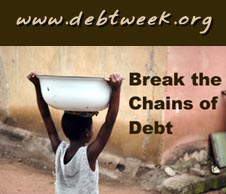THE INTERNATIONAL CAMPAIGN TO REDUCE THIRD WORLD DEBT: (ARCHIVED 1999-2005)
please visit Third World Debt (this page,1999-2000), more debt (this page 2000), march debt (2000-2001) and 2005 Debt.
|
|
 "No Mo Wo" © Alan Geoghegan |
The Australian, June 2005: Some of the world's poorest countries have cautiously welcomed a deal struck by the wealthiest nations to wipe out their debts. The agreement, which US Treasury Secretary John Snow described as historic, will immediately write off $US40 billion ($52.6 billion) of debt owed to the World Bank, International Monetary Fund and African Development Bank by 18 "heavily indebted poor countries", 14 of them in Africa.
They are Benin, Bolivia, Burkina Faso, Ethiopia, Ghana, Guyana, Honduras, Madagascar, Mali, Mauritania, Mozambique, Nicaragua, Niger, Rwanda, Senegal, Tanzania, Uganda and Zambia.
The deal was agreed by finance ministers of the so-called "Group of 8" - the US, Britain, Canada, France, Germany, Italy, Japan and Russia - meeting in London ahead of a G8 leaders' summit in Gleneagles, Scotland, next month. The 18 countries will save a combined $US1.5billion a year in debt repayments.
"moral hazard" concerns about cancelling debt that could affect the future creditworthiness of the countries concerned, said the G8 had agreed to put up extra money to meet the interest payments these countries and others would have made to the World Bank and the ADB over the next 10 years.
Britain will pay up to $US 960 million in interest over 10 years, with similar amounts from Germany and France. The US will pay up to $US 1.75 billion. Irish rock star and activist Bono welcomed the agreement but said much more needed to be done.
"There's more to go to really make this an end to extreme poverty, of course," he said, speaking from the German city of Cologne where his band, U2, is on tour.
"But this is one of the three asks that we have - debt (relief), a deal on an increase in aid flows, and a deal with the unfair trading that goes on between the richest countries and the poorest."
Bono has been a leading figure in a long-running campaign to lift billions of dollars of debt off the backs of African nations, enabling them to use money otherwise spent on interest payments to pay for schools and healthcare. He acknowledged that debt relief could not be divorced from the issue of better governance in Africa, saying: "Corruption is Africa's problem - it's actually the most important problem. There's no point in cancelling the debts and ending up redecorating presidential palaces."
Fellow singer Bob Geldof, who has organised the global Live 8 concerts to highlight global poverty and put pressure on the G8 to act, said: "Tomorrow, 280million Africans will wake up for the first time in their lives without owing you or me a penny from the burden of debt that has crippled them for so long."
Ugandan Information Minister Nsaba Buturo said the decision was "commendable", but added: "It's something that should have been done yesterday."
Ethiopian Finance Minister Sofian Ahmed said the cancellation of his country's debt was "very encouraging" and ministers in Nicaragua and Zambia said they would now be able to boost health and education programs. Another nine poor countries are close to a deal to cancel their debt, while 11 others could do so in the coming years, bringing the total helped to 38 and the amount of debt cancelled to a potential $US55billion.
"This is not a time for timidity but a time for boldness," Mr Brown said. "This is not a time for second best." The IMF and World Bank would maintain "strict supervision" to ensure the cash freed went to health, education and alleviating poverty. "We will take further steps to root out corruption," Mr Brown said.
Romilly Greenhill, of ActionAid, said: "The debt deal is very good news for the people in the 18 countries that will immediately benefit, and who will now see their debts written off. But it will do little to immediately help millions in at least 40 other countries that also need 100per cent debt relief."
The Gleneagles summit next month is expected to back a limited version of an international finance facility proposed by Mr Brown, in which money is raised for poor countries on the security of their future aid flows.
Saturday's meeting also opened the way for the oil-producing countries, which have benefited from record prices this year, to give more to the world's poor countries. A trust fund is to be set up aimed at helping countries affected by fluctuations in commodity prices.
The debt-relief plan was adopted after Britain managed to secure US backing on Friday, although disagreements remain over how much extra development aid poor countries should get and how to fund it, as well as an opening-up of world markets to poor economies.




